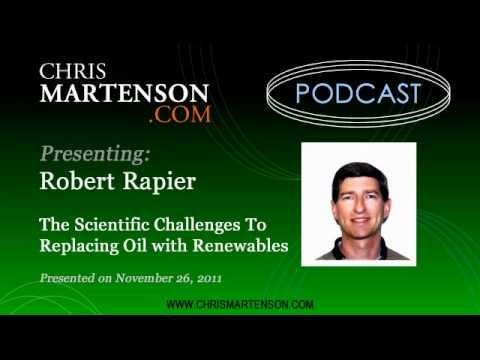 So, assuming the Peak Oil camp is on to something, what's the likelihood for a disruption-free transition to another energy source that can replace the energy output we currently enjoy from oil? There's no shortage of promising claims from new laboratory experiments, and there is a lot of optimism in political and entrepreneurial circles that renewable, alternative forms of energy (wind, solar, biofuels, etc.) may be able to fill the "energy gap" in time. How realistic are these hopes?
So, assuming the Peak Oil camp is on to something, what's the likelihood for a disruption-free transition to another energy source that can replace the energy output we currently enjoy from oil? There's no shortage of promising claims from new laboratory experiments, and there is a lot of optimism in political and entrepreneurial circles that renewable, alternative forms of energy (wind, solar, biofuels, etc.) may be able to fill the "energy gap" in time. How realistic are these hopes?
Not very, says Robert Rapier, energy specialist and Chief Technology Officer of Merica International.
The problem is one of return on invested energy. It is extremely difficult to create fuels with the same energy density that Nature has concocted over thousands of millennia without using up as much (or more) energy in the process.
When you think about what oil is, then you understand why these biofuels companies have a tough time of making it work. I mean, oil is accumulation of millions of years of biomass that has accumulated. Nature has applied the pressure, it’s applied the heat, and it has cooked these into very energy-dense hydrocarbons. Now what we are trying to do in real time is speed all this up. Somebody has to plant the biomass, somebody has to grow the biomass where nature did it in the first place. We have to transport it, we have to bring it into a factory, we have to get it in that form, we have to convert it from biomass into some fuel. We are adding energy and labor inputs all along and then finally we get a fuel out of the back end.
A lot of the time, a lot of these so-called "biofuels" are very heavily dependent on fossil fuels to begin with. So for some of them it is not even clear that they would be viable if you took the fossil fuels out of the process. When you think about all the labor and energy that goes into making a biofuel from an annual crop it becomes apparent why oil has been the dominant fuel for the last 150 years. It is much easier to go poke a hole in the ground and get that oil out of the ground than it is to go through all the labor of actually producing the fuel. So companies are competing against that.
On top of this, false hope and confusion is frequently created in the marketplace by new companies announcing "breakthroughs" that may indeed work in optimal laboratory environments, but just simply don't under real-world conditions, at scale:
The scale-up issue is the most important issue, because in my experience, most technologies get wiped out as they go up in scale. So something you may be able to do in a lab, 90% of those lab ideas don’t work, and only 10% will go on to make a pilot plan. And for lab experiments there are going to be all kinds of things: your catalyst didn’t work; your actual process didn’t work....
Let’s say your process did work in a lab. In the lab you are doing all kinds of things that are different than what you would do at a larger scale. Your waste products may not be a problem, you may have a small amount of bi-product that can be thrown away. Lab equipment is smaller and so the heat transfer in that lab equipment is very different than it is as you scale up. The example I give a lot is: think of a turkey. We are coming up on Thanksgiving. If you are cooking one turkey and you imagine an oven with the heating elements on the sides, that is simply one factor, and not everybody gets that right; the turkey is too dry, it’s overdone, it’s not cooked enough. Now imagine taking that turkey and scaling it up to cook, say, 1,000 turkeys an hour. You can imagine that the issues there are very, very different than they would be in a smaller oven. You maybe have turkeys in the middle that would still be cold while the turkeys on the outside are burnt to a crisp. So you are trying to get an even heating distribution across this larger oven, and it is the same as a reactor. As the reactor goes from lab scale up to larger scale, as you get heat differences and temperature differences inside that reactor you can make different products, different byproducts, more things that you didn’t want to make, or not as much of the thing that you did want to make.
And some companies will skip those steps. As you skip the steps, if you think about it – most technologies get knocked out at each step. So normally a company would go from lab scale to pilot scale to demonstration scale to a commercial scale. If somebody is jumping over steps they are greatly reducing the risk or their chance of success...
That will be the case with most of the biofuel companies out there making promises. They get out there; they will build their pilot plant. They will discover that things don’t work as they thought they would and then they will close down.
While it is critical we invest our current resources to finding solutions to the approaching energy gap, it's also essential we approach the situation realistically and with as little magical thinking as possible. Currently, the U.S. is consuming 10 million barrels per day more than it produces domestically. For perspective, our best ethanol refineries can produce around 4,000 barrels per day (at a much lower EROEI). And if we decided tomorrow to begin converting our transportation fleet to full-electric vehicles (i.e. away from liquid fuels), it would realistically take somewhere between 30-50 years to fully build out the infrastructure and retire the combustion-engine vehicles. The short of it is there is going to be no single fuel source that replaces oil, and the transition to a post-Peak-Oil future is going to involve a period of "less energy" for society for an undetermined period of time.
I think that we hope and we believe that our energy predicament can be solved by technology. We have seen technological advancement in so many different fields and we expect this is what we are going to see in the energy field. If you look at where computers have come over the last 30 years we expect that to happen with our energy production that the whole society is going to be running off of solar and wind power going forward. I sometimes say there is not always a neat solution to every problem. We have still got the common cold. It is still with us. That has not been cured despite it being around forever. So not all problems can be solved easily. And the energy problem is one that is not going to be solved easily in my opinion. Our society has grown up on something that was rich, abundant, and pretty easy to get to. We are trying to replace that with something that the energy required to get it and process it and produce it is a lot higher than the energy required to process oil.
There is not going to be one thing that replaces oil. I think there are going to be a lot of different things, and, more importantly, I think it is going to take a lot less oil than we are using now. The good news is we have dropped a million and a half barrels a day over the last five years. The bad news is a lot of that is because of the recession; it shows we do have some capacity to reduce our oil consumption. There is still a lot of low hanging fruit in my view. It is going to be painful as we scale down and some of the alternatives are going to have to meet somewhere -- at some level higher than they are today and at some level of oil consumption lower than we are today -- those will have to meet.
Click the play button below to listen to Chris' interview with Robert Rapier (runtime 52m:46s):
iTunes: Play/Download/Subscribe to the Podcast
Download/Play the Podcast
Report a Problem Playing the Podcast
Or click here to read the full transcript.
Robert Rapier has been devoted to energy issues and has worked on cellulosic ethanol, butanol production, oil refining, natural gas production, and gas-to-liquids (GTL). He grew up in Oklahoma, and received his Master’s in Chemical Engineering from Texas A&M University.
He is presently the Chief Technology Officer for Merica International, a renewable energy company. Merica is involved in a wide variety of projects, with a core focus on the localized use of biomass to energy for the benefit of local populations.
Robert is also the proprietor of the blog R-Squared, which fosters open discussions of Energy and the Environment.
Our series of podcast interviews with notable minds includes:
- Gordon Chang
- Turd Ferguson
- Eric Janszen
- Paul Brodsky
- Carolyn Baker
- David Stockman
- Rob Hopkins
- Joel Salatin
- Charles Hugh Smith
- Frank Barbera
- Nate Hagens
- David Morgan
- James Turk
- Eric Sprott
- John Rubino
- Addison Wiggin
- Simon Black
- Axel Merk
- Paul Tustain
- Francis Koster
- Dogs_In_A_Pile
- Bud Conrad
- John Williams
- Robert McFarlane
- David Collum
- Joe Saluzzi
- Jim Rogers
- Bill Fleckenstein
- Marc Faber
- Willet Kempton
- Dan Ariely
- Ted Butler
This is a companion discussion topic for the original entry at https://peakprosperity.com/robert-rapier-the-scientific-challenges-to-replacing-oil-with-renewables-2/
